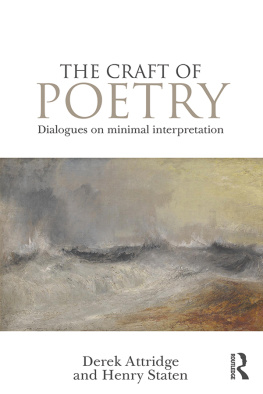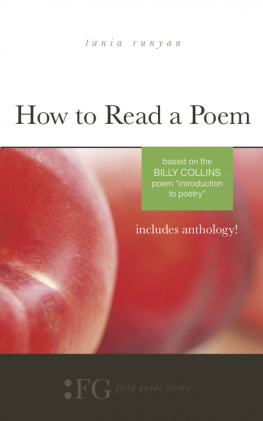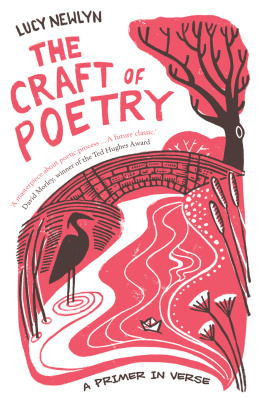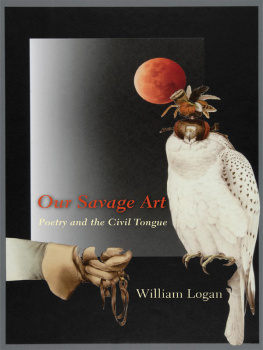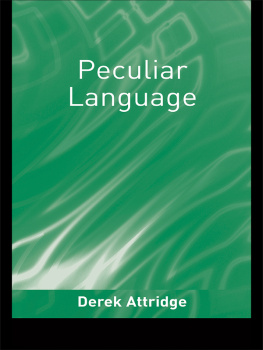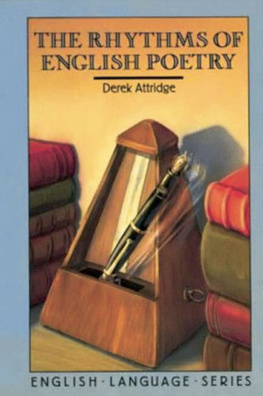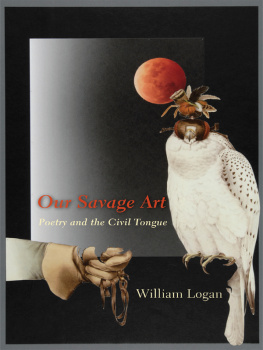THE CRAFT OF POETRY
This book presents an innovative format for poetry criticism that its authors call dialogical poetics. This approach shows that readings of poems, which in academic literary criticism often look like a product of settled knowledge, are in reality a continual negotiation between readers. Here, Derek Attridge and Henry Staten agree to rein in their own interpretive ingenuity and minimally interpret poems reading them with careful regard for what the poem can be shown to actually say, in detail and as a whole, from opening to closure. Based on a series of e-mails, the book explores a number of topics in the reading of poetry, including historical and intellectual context, modernist difficulty, the role of criticism, and translation. This highly readable book will appeal to anyone who enjoys poetry, offering an inspiring resource for students whilst also mounting a challenge to some of the approaches to poetry currently widespread in the academy.
Derek Attridge is Professor of English and Related Literature at the University of York, UK and a Fellow of the British Academy.
Henry Staten is Byron W. and Alice L. Lockwood Professor in the Humanities at the University of Washington, USA.
THE CRAFT OF POETRY
Dialogues on minimal interpretation
Derek Attridge and Henry Staten

First published 2015
by Routledge
2 Park Square, Milton Park, Abingdon, Oxon OX14 4RN
and by Routledge
711 Third Avenue, New York, NY 10017
Routledge is an imprint of the Taylor & Francis Group, an informa business
2015 Derek Attridge and Henry Staten
The right of Derek Attridge and Henry Staten to be identified as authors of this work has been asserted by them in accordance with sections 77 and 78 of the Copyright, Designs and Patents Act 1988.
All rights reserved. No part of this book may be reprinted or reproduced or utilized in any form or by any electronic, mechanical, or other means, now known or hereafter invented, including photocopying and recording, or in any information storage or retrieval system, without permission in writing from the publishers.
Trademark notice: Product or corporate names may be trademarks or registered trademarks, and are used only for identification and explanation without intent to infringe.
British Library Cataloguing-in-Publication Data
A catalogue record for this book is available from the British Library
Library of Congress Cataloging in Publication Data
Attridge, Derek.
The craft of poetry : dialogues on minimal interpretation / Derek Attridge and Henry Staten.
pages cm
Includes bibliographical references and index.
1. PoetryAppreciation. 2. Poetics. I. Staten, Henry, 1946II. Title.
PN1042.A87 2015
808.1dc23
2014040489
ISBN: 978-1-138-85006-4 (hbk)
ISBN: 978-1-138-85007-1 (pbk)
ISBN: 978-1-315-72498-0 (ebk)
CONTENTS
is a revision of an article first published in World Picture 2 (2009) and reprinted by kind permission of the editors.
The authors are grateful for permission to reprint poems as follows:
I started Early, in The Poems of Emily Dickinson, ed. R. W. Franklin (Harvard University Press, 1999).
Man Carrying Thing, in Collected Poetry and Prose of Wallace Stevens, ed. Frank Kermode and Joan Richardson (Library of America, 1997). Published by arrangement with Alfred A. Knopf, Inc.
Lennox Avenue: Midnight and Song for a Dark Girl, in Collected Poems of Langston Hughes, ed. Arnold Rampersad and David Roessel (Vintage Books, 1994).
Denise Riley, A Nueva York, Jacket Magazine, December 2003. Denise Riley. Reproduced by permission of the author.
Don Paterson, The Passing, in Orpheus. Don Paterson, 2007. Reproduced by permission of the author c/o Rogers, Coleridge & White Ltd., 20 Powis Mews, London W11 1JN.
This book is an actual series of e-mail conversations between its two authors, minimally edited for readability. It began when Derek Attridge was invited to contribute to an issue of the online journal World Picture on The Obvious, and proposed to Henry Staten that they write an article together as a dialogue on a single poem, Blakes Sick Rose. Our discussion of this poem was so involving for both of us, and raised so many further questions about the reading of poetry, that it grew into something much larger.
As we gradually saw, there is more to the dialogue form of our expositions than we initially realized something new, perhaps, in poetry criticism; we could call it dialogical poetics. We are accustomed to seeing all extended commentary on poetry as the vision of some individual consciousness the more individual and original, the better. There is almost always a significant degree of arbitrariness in the pronouncements of such solitary readers: associative leaps, inferences drawn, symbolic meanings perceived, that might be more or less plausible, but the justification of which we are left to figure out for ourselves if we can. In this book, by contrast, the two authors have had to justify their readings to each other, step by step; and we have left visible the process by which we worked through our perceptions to reach at least partial agreement.
By revealing the process of this working-through as a process of debate and discovery, we enable readers who are not professional critics to see what happens in criticism behind the curtains of assured knowledge. Polished academic readings of poems, and especially handbooks on the study of poetry, suggest that there is some kind of fixed and decided knowledge about how to read poetry, starting with critical terminology, whereas in reality interpretation and analysis are always in process. Any critic worth her salt is always struggling with method and even with terminology, and disagreeing with other critics about the best way forward. What this book tries to show is that theres no contradiction between the possibility of grounding reading in the poem itself, and the fact that readings are dynamic, complex, evolving negotiations. When we speak of what is really in the poem were not suggesting that there is an absolute boundary between what is inside and what is outside a poem, what is text and what is context, but rather that in any particular case this decision is the result of a critics engagement with other readers of the work perhaps in actual dialogue, like ours, and most likely in a response to what earlier critics have said.
As it happens, one of us Attridge has devoted a good part of his career to contesting some basic, widely established assumptions about poetic meter something that might seem to the reader of a standard manual on prosody to be the most cut-and-dried aspect of poetry criticism, but that is in fact an area of great obscurity and confusion, and has a long history of controversy. Attridges approach, presented in a number of books, is an attempt to understand meter on the basis of the most fundamental experience of rhythm, beginning in childhood and evident in popular verse and song all over the world. It is far from solving all the puzzles inherent in the complexities of metrical form, however; only in continuous testing and discussion, along with competing approaches, can progress be made in understanding this fundamental feature of the poetic tradition. And the most important goal in this continuing debate is not puzzle-solving but the heightening of the poems capacity to give us rhythmic pleasure.
Our aim in publishing our dialogues on poetry was to make a case for certain skills of poetry reading including prosody that we believe constitute basic poem literacy, and which over the past four decades have been shoved aside in many literature departments. In place of basic poem literacy, students have been taught meta approaches to poetry, approaches premised on the notion that poems are the product of interpretive techniques, mainly various kinds of contextualism. As a result, today there are ever fewer teachers who feel confident of their ability to instruct students how to read a poem so that they can understand what the poem literally
Next page
